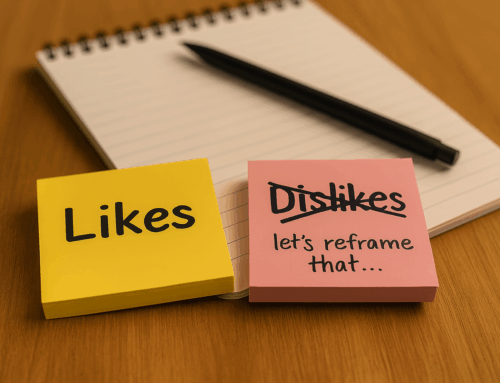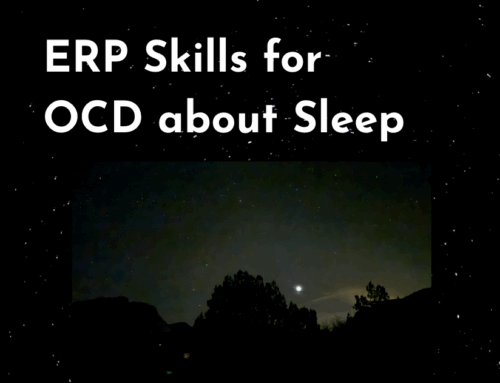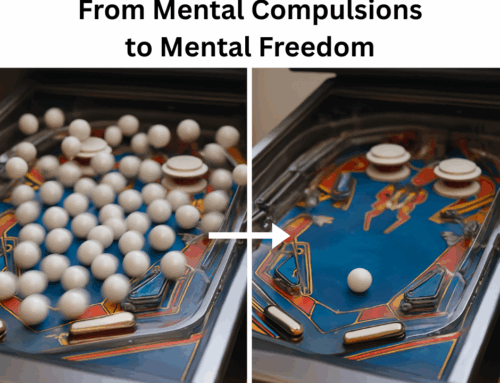My partner shared a social media post with me about “choose your hard” recently. You may have seen a version of this yourself, but the one I saw started with:
- Marriage is hard….Divorce is hard.
- Financial debt is hard….Financial discipline is hard.
- Bitterness is hard….Forgiveness is hard.
…and so on.
I’ve read some criticisms of the “choose your hard” concept online, saying that not everyone has the freedom to make choices that would yield the results they’d like (being out of debt vs in debt, for instance), and that these statements might diminish someone’s emotional experience in the face of these challenges. And I agree those criticisms could be valid in certain situations.
However, I think when it comes to OCD, the “choose your hard” concept could be an especially helpful perspective-shifting exercise. This is especially the case when we understand how OCD tries to warp our perspectives and how we can instead reframe them to empower you to make hard choices that help you reclaim your life.
What a “choose your hard” about OCD might look like
 A “choose your hard” about OCD might look something like this:
A “choose your hard” about OCD might look something like this:
- Having intrusive thoughts is hard…..Dealing with intrusive thoughts non-compulsively is hard.
- Experiencing anxiety is hard….Harnessing anxiety to do your ERP is hard.
- Feeling an urge to do a compulsion is hard…..Resisting the urge to do a compulsion is hard.
- Keeping the content of your obsessions a shameful secret (what my OCD called Rule #1) is hard….Sharing your obsessions with a therapist or trusted peer is hard.
- Listening to OCD tell you you’re not strong enough to get better is hard….Taking action and doing ERP even in the face of these doubts is hard.
I’ve structured these so the experience of OCD is on the left, and actions consistent with exposure and response prevention therapy, ERP, the evidence-based therapy for OCD, are on the right.
How OCD distorts the “hard” into “harder”
The experience of untreated OCD can feel overwhelming, and OCD uses that against us. It tells us repeatedly that the anxiety, the little jolts of adrenaline, and the urges to do compulsions are so uncomfortable that our best move is to just do a compulsion so we can “get rid” of those symptoms. It says that we couldn’t possibly do anything that would make us potentially feel worse, twisting the “choose your hard” statements into something like the following:
- Having intrusive thoughts is hard…..(OCD says) dealing with intrusive thoughts non-compulsively is harder.
- Experiencing anxiety is hard….(OCD says) harnessing anxiety to do your ERP is harder.
- Feeling an urge to do a compulsion is hard…..(OCD says) resisting the urge to do a compulsion is harder.
- Keeping the content of your obsessions a shameful secret (what my OCD called Rule #1) is hard….(OCD says) sharing your obsessions with a therapist or trusted peer is harder.
- Listening to OCD tell you you’re not strong enough to get better is hard….(OCD says) taking action and doing ERP even in the face of these doubts is harder.
A self-compassionate and empowering “choose your hard”
It’s in OCD’s best interests to make you think that ERP is too hard because that’s how it stays in control of your life.
Don’t buy its lies!
Instead, you can insert some self-compassionate empowerment into these statements. This helps you gain a new, more motivating perspective on the challenges both OCD and ERP present, and how choosing ERP is how we make things easier in the long term:
- Having intrusive thoughts is hard, and yes, I acknowledge that. While dealing with intrusive thoughts non-compulsively is also hard, I can do it, even though I’ll be imperfect.
- Experiencing anxiety is hard, and I’m going to be mindfully aware of that. I know that while harnessing anxiety to do my ERP is also hard, I’m willing to try it because it’s likely to make my life much easier in the long-run.
- Feeling an urge to do a compulsion is hard. But as Kimberley Quinlan says, “it’s a beautiful day to do hard things.” Therefore, even though resisting that compulsion is also hard, I want to stand up to my OCD and reclaim my life.
- Keeping the content of your obsessions a shameful secret (what my OCD called Rule #1) is hard. Most people with OCD feel this emotional weight during their treatment journey. While I recognize that sharing my obsessions with a therapist or trusted peer is also hard, doing so will help me take away some of my shame and OCD’s power.
- Listening to OCD tell you you’re not strong enough to get better is hard. Over time that can take a toll on how I feel. But I’m going to realize that OCD lies about everything to stay in control. While I know that taking action and doing ERP even in the face of these doubts is also hard, it gives me a much better chance of taking back my life.
Learn more about taming OCD
To learn more about how ERP was the foundation of my OCD-taming strategy to reclaim my life, see Is Fred in the Refrigerator? Taming OCD and Reclaiming My Life. Click here to purchase your copy.
Sign up for my Shoulders Back! newsletter to receive OCD-taming tips & resources, including notifications of new FredTalks, delivered every month to your inbox.
My blogs are not a replacement for therapy, and I encourage all readers who have obsessive compulsive disorder to find a competent ERP therapist. See the IOCDF treatment provider database for a provider near you. And never give up hope, because you can tame OCD and reclaim your life!







This is not exactly an “aha” moment but this OCD vs ERP blog could not have come at a better time. I was getting ready to tackle a very hard exposure. I thought I would check my email and Facebook first. Of course :inda am I really looking for encouragment or am I procrastinating. I am so hard on myself. But all of that aside I want to thank you for this blog I found it very helpful. Wishing all the best to you and everyone.